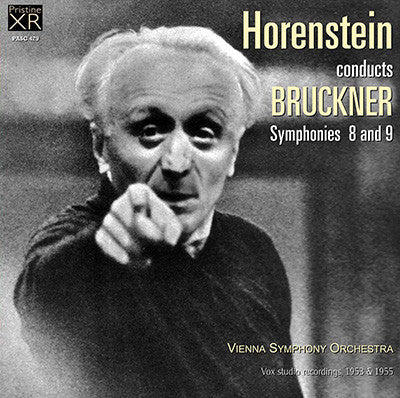
This album is included in the following sets:
This set contains the following albums:
- Producer's Note
- Full Track Listing
- Cover Art
- Historic Review
Jascha Horenstein's legendary 1950s Vox Bruckner symphonies
"Much gratitude is due Pristine Audio for this immensely gratifying release" - Fanfare
Jascha Horenstein is justifiably associated with the music of perhaps
two composers above all: Mahler and Bruckner. This release breathes new
life into two of his essential 1950s Vox Bruckner recordings with a
Vienna Symphony Orchestra (renamed, for contractual reasons, Pro Musica
Orchestra, Vienna on the original LPs). "This is Bruckner as he should
be—not a portentous bore, but a blazing visionary" wrote Deryck Cooke in
1963 of the 8th Symphony by Horenstein, the first recording of the 1890
version of the symphony in the then-newly published (1955) Novak
Critical Edition, whilst EMG Monthly Letter in 1956 reckoned it to be
"the greatest Bruckner performance we remember in twenty years, whether
on records, the radio, or in the concert hall."
From a technical
perspective both recordings have aged reasonably, but had a distance
and thinness of tone that failed to do justice either to the music or to
the orchestra. Bruckner's symphonic music demands size, weight and
depth to make its full impact, something the original Vox recordings
captured but concealed. I'm certain they were impressive for their time
but they dated quickly. This 32-bit XR remastering aims to rectify that,
and deserves to be savoured in its full, glorious Ambient Stereo
incarnation for full impact. Both recordings suffered from tape speed
drift, most particularly the 8th, this I have corrected for the first
time; there were also tape dropout issues on the 8th that I've
addressed. But it is for the overall impact of an orchestral tone
enriched and given weight, top-end extension and dimension that this
Pristine release will really stand out.
Andrew Rose
Vienna Symphony Orchestra
Jascha Horenstein, conductor
Recorded at Symphonia Studio, Vienna, September 1955
Engineer: Josef Duron
Producer: Imre Rósza
Issued as Vox PL.9682
Vienna Symphony Orchestra
Jascha Horenstein, conductor
Recorded at Symphonia Studio, Vienna, February 1953
Engineer: Josef Duron
Producer: Imre Rósza
Issued as Vox PL.8040
Symphony No. 9
This is the sort of production that puts music-lovers in great debt to the gramophone: fine music rarely heard in this country, a deeply convincing performance, and a recording that is a complete success. Bruckner did not live to finish this symphony and the sketches he had made for the last movement were not nearly complete enough for anyone else to put them together. The work ends, therefore, with its slow movement, a piece of enormous size that needs, and repays, repeated hearing. The other two movements are easier, especially the wonderful Scherzo (which any hesitant listener might try first).
But with a performance such as this, spacious and beautifully judged as it is, there is little need for hesitancy. Whatever one gets out of it at a first hearing, I think it would be impossible to reach the end of this record without the feeling that one had been through something in the way of a deep and great experience. I cannot over-praise Horenstein's handling of this score and the orchestra gives us lovely playing throughout. Finally, as I have said, Vox have produced a really fine recording with a rich quality of sound that is just what Bruckner’s music wants—above all, fine string tone and with plenty of double-bass to give the whole sound solidity. This is a record not to miss.
T.H.
The Gramophone, March 1955

